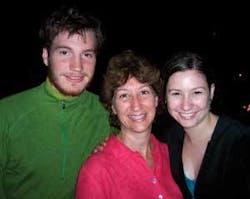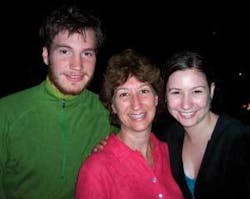Rescue from Lebanon
WRITTEN BY: Lisa Marie Samaha, DDS, FAGD
My heart is warm with humility and gratefulness. Our region of the United States enjoys a magnificent U.S. military presence, but I never imagined that my children and I would need the rescue efforts of those same armed services.
On July 9, my college-aged children and I arrived in Beirut, Lebanon. On July 23, we made it safely home to Virginia. We are overcome with a renewed sense of the value of freedom and peace that our country enjoys, as well as the sacrifice that so many have made and continue to make for freedom and peace to endure as our reality.
From the earliest moments of turmoil in the Middle East, which began only three days after we arrived in the beautiful country of my ancestors, I reflected upon the belief that God had placed us there at that time for a reason.
For nearly 32 years I had been making plans to go to Lebanon, but the threat or reality of war was always a deterrent. This past February, though, I was invited to present my dental research at the American University of Beirut’s Medical Center, and I made plans to take my children with me.
Despite the warnings from so many, I was convinced this trip was going to be a good thing. I was inspired that this was the right time for us to experience the land of my parents and grandparents. I also felt honored to be chosen to lecture to a learned group of medical colleagues and students.
The Middle East story is complex, to be sure, and I have grown weary of the drama. I have asked myself countless times, “Why can’t ‘these people’ get their act together and stop fighting?” I think it is safe to say that those of us Americans who were born and raised here have very little patience for this sort of thing. Our ability to empathize with any lives endangered or lost is numbed because we can’t quite get our minds around the reality of it all. And with the harried pace of American life, we just can’t be bothered. The fact that the battles occur far from our shores seems to dull the veracity of the war.
The conflict in the Middle East seems senseless, making it easy for us to turn our minds and hearts away from its truth. Those who have emigrated to the United States from war-torn lands or have served in our military, surely have a greater empathy for the innocent lives traumatized and lost by such conflict. Although I am not acquainted with many, I have a more personal attachment to the civilians and military who have sacrificed in these pursuits.
Since the military is taking a lot of heat these days, I would like to tell of their heroic efforts in our time of need. Although the Department of State and the U.S. Embassy in Lebanon created a tremendous amount of confusion, frustration, and stress during the days of evacuation, the Department of Defense was redemptive. When the Marines arrived at Dbeyeh Port, order was manifest out of the chaotic screams and fears of thousands of tired and scared Lebanese Americans, many who had lived through years of war in Lebanon. They were desperate and frantic for their children to be protected from reliving their traumatic history.
The Marines who greeted us were kind, gentle, reassuring, and efficient - a breath of fresh air in a sky overcast by bombings. They were concerned for our comfort and offered assistance in any way necessary. The Marines offered us strength, relief, and a sense of security that we had not known the previous 10 days. After processing us, they caringly transferred us into the arms of the Navy aboard the U.S.S. Trenton, based out of Norfolk, Va. To discover that these particular sailors were based in my hometown area offered an immediate sense of pride and attachment. After approximately 14 hours of carefully processing each of us, they offered the more than 2,000 U.S. citizens on the ship food, blankets, pillows, cots, and sheets. Amazingly, no one was hurt or lost aboard the crowded ship, which holds 1,300 at full capacity and was carrying 2,400 that day. Anyone who needed medical or dental care received help.
The sailors walked the ship from front to back to ask how they could help, and they always kept warm smiles on their fatigued faces. By the time my family boarded, all of the sailors’ bunks were taken, and we were relegated to the open decks of the large amphibious carrier. We took our rationed, scanty belongings and found a spot of decking to call our own for the 12-plus-hour voyage to Cyprus.
Absolute dark comes over a ship in wartime in the middle of the sea in the middle of the night. After night fell, people tried to get some rest. The lines all day had been long and hot, and the wait to get aboard had been grueling. I tried to rest on my crisp, white, government-issued sheet, but the beauty of the world about me was too good to let go. For the next few hours, while all was still and black, I lay awake, comforted by the peaceful embrace of the cool Mediterranean breezes and stunned by the extraordinary spray of stars in the heavens. It was at this time that I was overcome by a feeling of utter security. I felt so safe and so cared for. Surely, I thought, this was the experience of an infant held snugly, protectively in its mother’s arms. This was peace. And my military created it for me.
Upon arriving in Cyprus, we waited for the Air Force to complete the rescue. They did not let us down. After further processing, we boarded a C-17 cargo jet and headed to Ramstein Air Force Base, Germany. During the noisy flight, I was overcome by the sheer number of people, struggling for much-needed rest. The crew was again watchful and kind. Like the others, they were sensitive to the situation from which we had escaped. While my fellow “refugees” were asleep, I shared a bit of appreciation with the airman on watch. He asked me a poignant question, “Where are all the husbands?” I hadn’t even given it a second thought because this is an ongoing reality for so many Lebanese women. They come for a summer in Lebanon with their children to give them the opportunity to experience the precious love of their grandparents and other relatives. Because of a family’s commitment to its heritage, the children learn the language and rich customs of the Lebanese culture. At some point when they can take time from their work, the husbands join the family. The majority of refugees were women with many small children. They were encumbered with strollers, formula, diaper bags, and all other paraphernalia necessary for children. These women and children often required exceptional physical and emotional attention, which was freely given by our U.S. military.
At Ramstein, we were warmly greeted and offered another hot meal, as well as toiletries and phone cards. More processing followed and we were off again. At about 1:30 a.m. on July 23, our third day of travel, we touched down at McGuire Air Force Base in New Jersey. Despite the hour, we were greeted by a myriad of smiling faces and a hot, nourishing meal. The Air Force, the International Red Cross, travel agents, and immigrations and customs officials assisted us through more processing, bringing us closer to our final destination. My children and I were fortunate to have family members welcome us and drive us home to Newport News, Va.
Americans, typically detached from the trauma of war, need to “put a face” on the experiences of war. Because of our short, intense time with Lebanese family, my children and I came to know and love them. We have an intimate connection to each of them. We pray fervently for their protection and trust in our United States to help secure a cease-fire, relieving them of the horror they and their countrymen are living.
Perhaps part of my role in this journey is to tell a story of the warmth of the people, the beauty of the land, and the trauma of war. Perhaps it is to remind each of us of the compassionate spirit of our armed services as they cared for the people of our country during the extraordinary rescue of nearly 15,000 American citizens from Lebanon. Within the first moments of our engagement with the U.S. military, I attached myself to them in an extraordinarily personal way. These were “my” Marines, “my” sailors, “my” airmen, and “my” Army.
Warmest regards, blessings, and peace to all!
The 2006 Israel-Lebanon conflict, known in Lebanon as the July War and in Israel as the Second Lebanon War, was a military conflict in Lebanon and northern Israel, primarily between Hezbollah paramilitary forces and Israel. It started on July 12, 2006, and ended when a United Nations-brokered ceasefire went into effect on Aug. 14, 2006.
The conflict killed more than 1,500 people, mostly Lebanese civilians, severely damaged Lebanese infrastructure, displaced about one million Lebanese and 500,000 Israelis, and disrupted normal life across all of Lebanon and northern Israel. Even after the ceasefire, 256,000 Lebanese remained internally displaced.
Source: www.wikipedia.org

